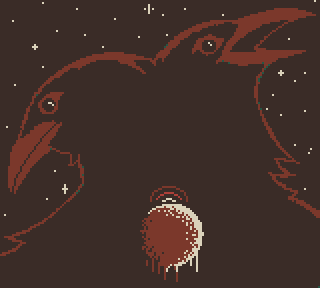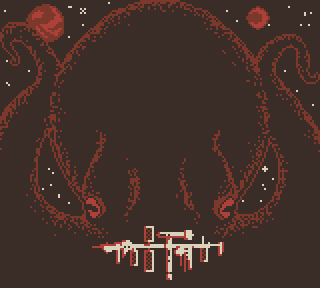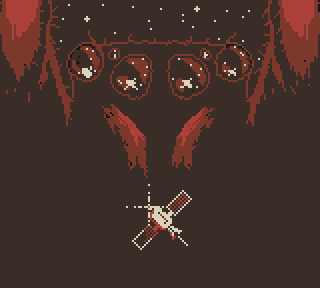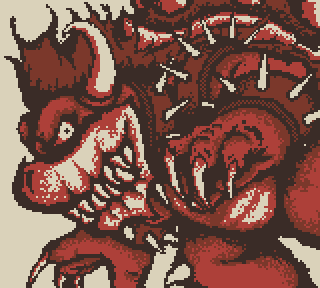Game Thoughts: Klonoa (GBA)
I beat Klonoa: Empire of Dreams today on my day off.
I got my hands on an Analogue Pocket about a month ago and really wanted to
play something I hadn't before, so I took it upon myself to visit the local
retro game store and drop too much money on old games I could easily
emulate. Everything I actually wanted was out of my random-purchase range,
so I ended up buying Klonoa -- a series I know by name only.
It was a great little puzzle platformer, and I must say the Analogue Pocket
really makes GBA titles look good.
I think there was something like 5 worlds x 7 levels plus 6 bosses. The
bosses and snowboarding levels were hot garbage, but the normal levels had
some really decent puzzling throughout and the auto-scroll levels actually
posed a challenge.
I'll need to play a different game to test out the Analogue's sound system,
because the SFX and music in Klonoa were pretty terrible, but I'm excited to
finally tackle some of the physical GBA and GBC titles I've collected over
the years.
Book Thoughts: Babel
I finished the audiobook version of Babel by R.F. Kuang,
and while I had a great time with the majority of the book, I feel like it
really got lost in its own message at the end, which really killed an
otherwise enjoyable story taking place in a slightly magic-ified alternative
late 1800's Britain.
Honestly all aspects of the story were interesting, and I found that the
anti-colonialist theme, while laid on fairly thick, was channelled very well
through the characters and plot. At around the 3/4 mark, however, the author
just kinda threw it all away to beat the reader over the head with the
message, and as a result flattened the characters, truncated the story, and
just kinda poisoned the experience.
Maybe that was the plan all along, but it honestly felt rushed and poorly
thought out at the end, which is a shame because the rest was great.
Project Updates: Mar 26 2024
I figured it may as good a time as any to pen down a list of my current projects. Work intensity has been high lately, so I don't have a terrible amount of juice to pour into after-work creative stuff, but here's what we've got cooking:
TIC-80 Game: The Tower of Einar
I've had this very simple idea for a game for a long while: platformer that's all wall-jumps and no platforms. Not sure if it will end up being particularly novel, but I spent most of January building the first 10 screens and releasing a demo.
So far it's been a real joy working with Lua and TIC-80. I've fallen out of it for a month or so, but I'm looking forward to picking it back up for round 2.
You can play the demo on Itch.io or the TIC-80 website.
Static Site Generator
I maintain this website with a single .js script and a bunch of hand-written HTML files and honestly I kinda like it that way. I've got a friend, however, who's interested in maintaining a bespoke low-spec static site, but is much less enamoured by the idea of raw HTML or learning markdown.
There's a million SSG apps out there, but a good chunk of them seem to be targeting nerds like me, and I want to make something that can work without an install script, but still provide own-your-own-files autonomy, and discovered the Filesystem API in JavaScript.
If I pull this off right, I'll have a static site hosted on github pages or something that will act as a SSG for a local folder on your computer. A fun idea, I think!
Duel of Nobles
Finally, I've recently uploaded some old rules from a card game I made a while back (made is strong here, is a riff on an existing obscure game) called Duel of Nobles.
I started tweaking the rules based on some feedback from friends I got 3 years ago, and am going to work on assembling some graphics or animations or something to make the instructions a bit easier to understand.
It's a bit like playing Pokemon or YuGiOh cards, but it just uses a standard deck. You can check out the rules I posted (no pictures yet).
Future
I've got some other big projects looming in the back of my head that I'm slowly working up the courage to start on. I don't think I have the technical or philosophical skills to pull any of them off, but working on the Tower of Einar has reminded me that just making stuff can be fun, even if it's not stellar.
Book Thoughts: Children of Memory
I tore straight into Children of Memory after the previous
book, but only now got around to making my pixel art cover for it.
The final instalment is definitely the strangest by a long shot, positioning
itself more as a mystery novel set in a SciFi setting. To that end, it was
wonderfully weird. I loved the Corvids, the Witch, and the strangeness of it
all. It picks at questions about sentience and identity and it does some
interesting things with established races.
Like book 2, this novel can't hold a candle to Children of Time, but I'd
happily read a hundred more weird scifi adventures in this universe.
...I mean that, Adrian. Please give us a full Star Trek experience but with
your uplifted races; I'm here for it.
Book Thoughts: Skyward Inn
I also just completed the Skyward Inn audiobook, and I
honestly didn't like it very much.
While the alien strangeness and occurrences in the novel were interesting,
the presentation was just so weepy.
I think a lot of that is on the narrator, who made most of the characters
sound like they were on the very edge of bursting into tears at all times.
Perhaps they were, perhaps it was the right call, but holy hell it put a
damper on the experience.
I'm no stranger to a little ennui in my scifi but this was just way too
much.
By the time the ending was happening and things got explained I just wanted
it to be over.
If you like your scifi with a lot of family drama and a side of mope, give
it a go.
Game Thoughts: Paradise Killer
I recently finished a playthrough of Paradise Killer and
I'm seriously floored at how good it was.
The game is presented as a single explorable island with a handful of 2D
characters to interrogate and a bunch of clues laying around to find.
Gameplay-wise it's honestly pretty barebones -- just walk, chat, collect,
repeat. The story and music do some seriously heavy lifting,
though.
You play as Lady Love Dies, an investigator who has been exiled for the last
million years for being tricked by a god from outer space. You need to
return to the sequence of failing islands housing immortals to solve a crime
involving demons and gods and magical cars.
The way the world has been constructed in Paradise Killer is
fascinating in that the creators ensured that everything to do with
the core mystery was easy to understand and logical. A lot of matching up
timelines, cross-checking alibis, determining motives. Everything -else- is
borderline nonsense. Everyone is named ridiculously, there's a person who
makes islands out of psychic powers, talking skeletons, demonic possessions,
and backstory that makes little to no actual sense but is
really fun to read.
I thoroughly enjoyed the very basic gameplay loop, wandering the empty
vaporwave-aesthetics island, jumping awkwardly up cliffs to pick up
collectables that tell you about the completely irrelevant and wild pantheon
and crazy backstories, all while slowly puzzling together the intricate
pieces of the investigation.
The mystery was presented wonderfully! There were many times I thought I had
everything cracked only to find one more clue that threw everything
out the window. I was seeing plans everywhere, and suspecting everyone.
The final jury sequence was also very fun and had me questioning myself at
times as I reviewed and presented all the evidence I had collected.
It took me 2 or 3 attempts to get into the game, but I'm glad I took another
shot at it. It was a super memorable experience and reminded me how much can
be done with so little, and filled my head with ideas.
Book Thoughts: Children of Ruin
After reading Children of Time (which was seriously a masterpiece) I ran
headlong into Children of Ruin hungry for more.
While the sequel isn't the science fiction masterpiece Children of Time was,
I'm entirely satisfied with where Adrian Tchaikovsky is taking the series.
What Children of Ruin lacks in gripping evolutionary story (There's still
some of that, it's just not as good), it makes up for in narrative and
exploration of interesting concepts. The technology, biology, and psychology
in the book are really fascinating, and the story does a good job
continuing where the first book left off.
I absolutely loved the human characters of Baltiel and Senkovi. I feel the
author perfectly captured the sometimes childlike nature of the
scientist-adventurer. I also enjoyed the moral/philosophical messages the
author continues to explore: different is good. I found
this idea somewhat fumbled in the conclusion of the first novel, but
wonderfully expanded on and demonstrated in this story.
I'm excited for the third book in the series. What started as a biological
scifi has evolved into a sort of space opera -- and while we may have
arrived at an almost trope-ish assembly of alien races and AIs, it hits
different when you watched them all grow up.
Book Thoughts: Children of Time
I've just finished the audiobook version of
Children of Time by Adrian Tchaikovsky and it blew my silk
socks off.
I'm going straight into massive spoilers on this one, so I'll hide it behind
a jump.
- Read the rest -
Book Thoughts: Lord of the Rings (Trilogy)
It's been two whole months since I posted about a book, and
that's because I've been listening to the entire
Lord of the Rings trilogy in one go.
This was my first time reading/listening to the trilogy and I got the Andy
Serkis (mocap/voice of Golum) audiobook version. He does a
fantastic job giving each character a voice, and clearly tried to
imitate the voices of the actors from the films.
There's not much to say about these books that hasn't been said at this
point, so I want to approach this as a review of the differences between the
books (specifically this version of the audiobooks) and the films.
- Read the rest -
Game Thoughts: Super Mario RPG (2024)
Today I finished Super Mario RPG. I never owned the
original as a kid, but definitely rented it a handful of times in my youth.
I've also played it multiple times on emulators and own a physical copy I
bought years ago to adorn a shelf -- but I don't think in all my experiences
I've ever made it past chasing the dinosaur after Mallow joins up. The
Switch remake was a good excuse to finally cross this one off my backlog, as
I'm an RPGs-in-bed kinda person.
It was exactly what it sells itself as: a 12-hour silly charming turn-based
RPG featuring Mario characters. It was simple fun without much to take away,
though I like to try to take something away from each thing I play.
Here I'd like to focus on the combat. While the combat system in the game is fairly
simple turn-based RPG stuff, it does something a little extra for
interactivity: during attacks and spells you can hit A at
just the right time to increase damage, add additional effects, or even
completely negate damage when the attack is directed at one of your own
characters. While I can think of several RPGs with a "click button at the
right time for bonus damage", I feel the addition of
blocking damage is a rarer feature. While it trivialised some boss
battles, it definitely kept me more engaged in even basic battles, and I
think it would be an interesting feature within a more robust battle system.
On that note, there's not much in Mario RPG that's robust outside
of its charm. It's really just a bog standard RPG mechanically and
progression-wise -- you go to the next town, buy the only available upgrade
for each character**, solve the local issue, move along.
That said, there's so much charm that it transforms a basic RPG
template into a super fun experience that manages to constantly surprise (if
not challenge) with silly events, weird bosses with weird abilities, and
charming locations. It's a wonderful and consistently funny experience.
Overall I had a great time with the game and its cast, but I'm glad it's
short; by the last area I found my party overpowered and was on the cusp of
getting bored, but the credits rolled before it could sink in.
**Obvious exceptions being some of the end-game equipment and Work
Pants, which are WAY too OP and make almost all other armour you can
acquire in other towns obsolete.




